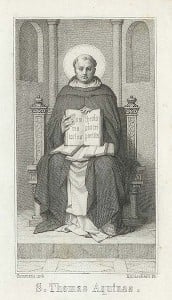 We’re blogging through St. Thomas Aquinas’ Compendium Theologiae, sometimes called his Shorter Summa. Find the previous posts here.
We’re blogging through St. Thomas Aquinas’ Compendium Theologiae, sometimes called his Shorter Summa. Find the previous posts here.
Today’s post is from Chapter 66, “Identity between the Relative Properties and the Divine Essence”.
In the past chapters Thomas has analyzed the nature of the Trinity in metaphysical terms; the discussion has been technical, complex, and not entirely satisfying, for the simple reason that God doesn’t fit neatly into any of the usual metaphysical categories. God is unique, and also infinitely beyond our grasp; all we can do (beyond the few truths of natural theology) is hold fast to the things He has revealed about himself. We know, from both revelation and reason, that God is One and metaphysically simple; we know from revelation that God is also Father, Son, and Holy Spirit. Thomas has been concerned to make the best sense of this he can using the tools of Aristotelian metaphysics, and to be extremely clear about what he is doing.
Why so? Tiny errors in the beginning turn into massive errors in the end. It is almost impossibly difficult not to fall into unintentional heresy when speaking of the nature of the Trinity, especially when using technical metaphysical language; and the remote implications of small errors are far from obvious. Thomas is trying to warn his Scholastic readers away from some of these unforeseen pitfalls.
And here, finally, he comes back to the main point: the Trinity is real, by revelation; we must accept it, and mustn’t water it down into mere metaphor. But at the same time, God remains One; we cannot understand the Trinity in a way that cuts God into three pieces.
And therefore, the relative properties of paternity, filiation, and spiration must be identical to the divine essence: which is to say that the Three Persons are the One God.
The relative properties must be the divine essence itself. For the relative properties are precisely the subsistent persons. But a person subsisting in the Godhead cannot be something other than the divine essence; and the divine essence is God Himself, as was shown above. Therefore the relative properties are in all reality identical with the divine essence.
Moreover, whatever is in a being besides its essence, is in it accidentally. But there cannot be any accidents in God, as was pointed out above. Accordingly the relative properties are not really distinct from the divine essence.
We are nearing the end of Thomas’ discussion of the Trinity; we have dotted the final i this week and we will cross the final t next week.
____
photo credit: Public Domain; source Wikimedia Commons











